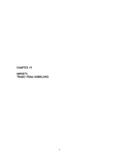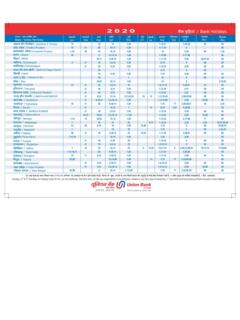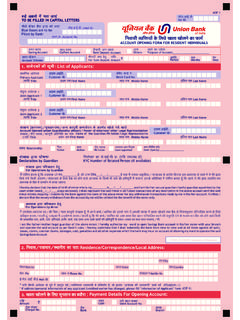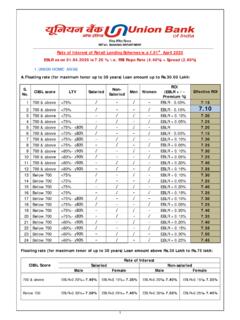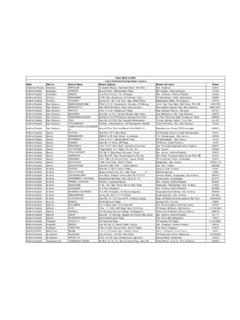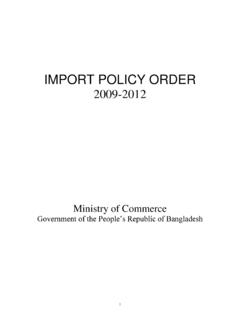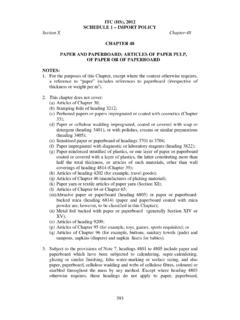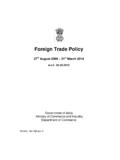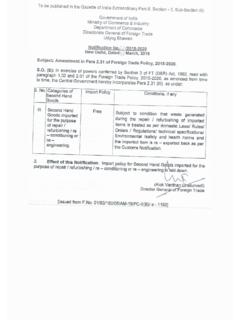Transcription of CHAPTER 23 IMPORT BILLS ON COLLECTION - …
1 CHAPTER 23 IMPORT BILLS ON COLLECTION 2 CHAPTER 23 IMPORT BILLS ON COLLECTION INDEX Para No TOPIC Page No 23 Introduction 3 23 1 Direct Receipt of IMPORT BILLS by the Importer 4 23 2 Procedure for Handling IMPORT BILLS 6 23 3 Endorsement of Licence 10 23 4 Follow up for bill of Entry 10 23 4 1 Bank policy for bill of Entry follow up 12 23 5 Unpaid IMPORT COLLECTION BILLS 15 23 6 Stamp Duty 15 23 7 Prepayment of IMPORT BILLS 16 Annex No Annexure 1 Letter to overseas bank regarding missing documents 17 2 Letter to overseas bank seeking instructions when importer is not our client 18 3 ECB 20 4 Proposal for Short Term Foreign Currency Loan 21 5 Acknowledgement slip for evidence of IMPORT 24 3 23 INTORDUCTION Branches should strictly adhere to Know Your Customers Rules while handling IMPORT BILLS received on COLLECTION basis on behalf of their customers.
2 Some of the precautions to be observed are : Following are the FEMA guidelines pertaining to handling of IMPORT BILLS by banks. Even though Bank advances are not involved, utmost care must be exercised by the Bank to avoid handling of fake IMPORT BILLS , which if undetected will lead to outflow of forex without any physical imports taking place. Bonafides of importer customer, particularly a new customer, has to be established. Branch has to satisfy itself about the financial status/standing of the importer. If branch is not fully satisfied about importer s standing, credit report on the supplier has to be called for from overseas banks/reputed credit agencies.
3 Specific comments as to whether supplier is ordinarily engaged in manufacturing / trading in the commodity sought to be imported is to be called for. Payment in respect of IMPORT BILLS are to be authorised by Branch Manager / Head of Forex Department of B category branch in case of ELB who should apply his mind on the following factors : i) Is the importer banking with the branch for reasonably long period ? ii) Whether the importer is availing any credit facilities in the branch ? iii) Has the branch examined the Balance Sheet of the importer ? iv) Is the importer dealing in the goods sought to be imported ? v) Has the importer s business place / godown been visited ?
4 Vi) Are sale proceeds regularly credited to importer s CD/CC a/c? Are the credits of cash / non-cash nature ? 4 vii) Does the importer has the requisite license or permission to IMPORT the goods and does he have the for the trade ? Brief comments on the above points should be held on record and the Branch Manager / Head of Forex Department of B category branch in case of ELB should hold record of such approval / decision. Decision to permit payment of IMPORT bill to be taken based on track record and financial position of the importer. In case of doubt branch can insist upon:- i) Verification of importer s books of account ii) Inspection of importer s office/godown.
5 Iii) Market enquiries with other leading importers in the same line of business iv) Credit report on overseas seller and confirm that they are capable of supplying the material. If the IMPORT bill pertains to C Category branches detailed status report / certificate on the importer on various points detailed above has to be obtained before authorising remittance. Above exercise has to be undertaken even in the case of IMPORT BILLS received under LCs backed by 110% cash margin. Branches should send copies of BILLS of Entry (BE) on random basis particularly in respect of new / relatively new accounts, to the concerned office of customs for verification / online verification.
6 The same should be followed up for confirmation of genuineness or their report on bill of Entry. The relative confirmation / report has to be preserved for verification by Internal / RBI auditors. DIRECT RECEIPT OF IMPORT BILLS BY THE IMPORTER IMPORT BILLS and documents should normally be received from the banker of the supplier by the banker of the importer in India. Authorised dealers should not, therefore, make remittances where 5 IMPORT BILLS have been received directly by the importers from the overseas supplier, except in the following cases: a. Where the value of IMPORT bill does not exceed USD 300,000. b. IMPORT BILLS received by wholly-owned Indian subsidiaries of foreign companies from their principals.
7 C. IMPORT BILLS received by Status Holder Exporters as defined in Foreign Trade Policy, 100% Export Oriented Units / Units in Special Economic Zones, Public Sector Undertakings and Limited Companies. d. IMPORT BILLS received by all limited companies viz. public limited, deemed public limited and private limited companies. While undertaking such transactions, the AD Category - I banks must ensure that : a. The IMPORT transactions are as per the prevailing Foreign Trade Policy. b. The transactions are based on their commercial judgment and they are satisfied about the bonafides of the transactions. c. AD Category - I banks should do the KYC and due diligence exercise and should be fully satisfied about the financial standing / status and track record of the importer customer.
8 Before extending the facility, they should also obtain a report on each individual overseas supplier from the overseas banker or reputed overseas credit rating agency. d. Before extending the facility, the AD Category - I bank should obtain a report on each individual overseas supplier from the overseas banker or a reputed overseas credit agency. However, such credit report on the overseas supplier need not be obtained in cases where the invoice value does not exceed USD 300,000 provided the AD Category - I bank is satisfied about the bonafides of the transaction and track record of the importer constituent. Branch should maintain record of IMPORT bill directly received from overseas seller.
9 This record is to be produced for scrutiny by Internal / RBI auditors. 6 PROCEDURE FOR HANDLING IMPORT BILLS On receipt of IMPORT BILLS , enter in Safe in Register and allot running serial number prefixing IMPORT bill Code NU and branch code, allotted by IBD., Verify whether all documents listed in the covering schedule have actually been received. Instances of missing documents should be intimated to the forwarding bank as per Ann. No. 23(1). Ensure that payment instructions are available in the covering schedule (DP or DA). In case of ambiguity, call for clear instructions. If any of the instructions of the forwarding bank, contravene FEMA regulations, the same is to be brought to their notice and revised instructions are to be obtained.
10 Particularly rate of interest should not exceed rate prescribed for trade credits from time to time. In case of payment of sight bill of C category branch, B category branch must obtain a instructions from C category branch and confirmation that they are holding margin to the extent of 110% of the bill amount before effecting the remittance on account of their customer. If the drawee is not banking with our branches details of his banker s name and address may be obtained and documents may be re-directed to his bankers after obtaining forwarding bank s approval, claiming our charges from drawee. Letter as per Ann. (2) is to be sent to the forwarding bank.

